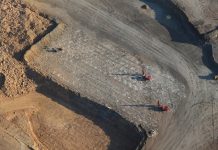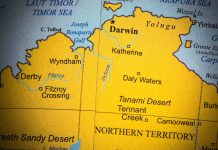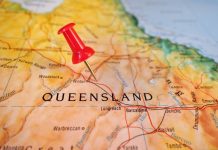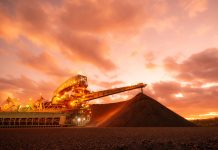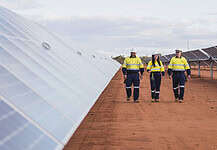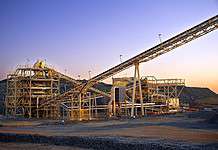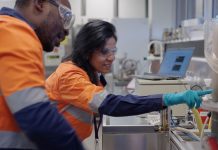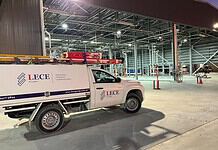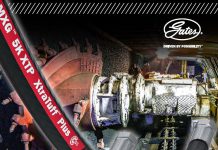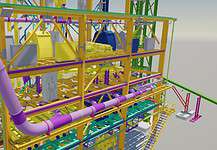The Whyalla steelworks operation. Image Arrium. Photography Sean Kelly.
By Elizabeth Fabri
HOME to 68 per cent of the nation’s copper and 25 per cent of the world’s known uranium, South Australia’s resources industry is an irrefutable force. Additional state government support, which aims to kick-start investment and sector growth, reflects its importance.
South Australia, affectionately known as the ‘Copper Kingdom’, has been a key contributor to Australia’s mining industry as far back as the 1800s, and today boasts the world’s largest uranium deposit and the country’s largest underground mine, Olympic Dam.
In 2014/15 the State’s minerals and petroleum sector had a gross value of product at $5.958 billion and regionally the industry contributed a gross regional product of $6.377bn.
While established operations are peppered across the State, the region maintains more than 700 exploration licenses and more than 20 advanced projects in exploration, feasibility and resource definition phases, signifying great promise for the future.
In addition to copper and uranium, commodities such as iron ore, gold, graphite, zinc and zircon are generating interest. However, the fate of the sector is resting on a rapid solution to the high energy prices experienced across the State in recent years.
“At this point in time electricity is the number one, two and three thing that needs to be dealt with for the resources sector to thrive,” South Australian Chamber of Mines and Energy (SACOME) chief executive Jason Kuchel said.
“Typically contract pricing is … double what it is in the other eastern states at this point in time.
“Until we can actually lower these it makes it very difficult for a number of projects to get up or additional investment dollars to be put into South Australia.”
Despite inflated energy pricing, support from the State government has brought renewed confidence in the sector with a number of initiatives introduced in the last 12 months set to promote growth.
Budget highlights
The State budget, released on 7 July, committed substantial funds to building a globally competitive resources sector, and was welcomed by the industry with open arms.
Key areas of focus include the State’s Plan for Accelerating Exploration (PACE) Copper initiative; along with the PACE Supply Chain Development Program; a Mining and Petroleum Services Centre of Excellence; magnetite strategy; and almost $70 million to support steelmaking, businesses, and the community of Whyalla.
“It is important to remember the value of our resources sector and what it does for not only our cities, but the regional hubs of our state,” Mr Kuchel said.
“Regional towns near mining operations rely on those projects to stimulate life into their economies.”
The Whyalla spend was promised in June ahead of the budget, and involved $50m over two years to support the new owner of the Whyalla steelworks operations, following Arrium’s voluntary administration in April.
“These steps are critical for the regional economy and employment in the town,” Mr Kuchel said.
“Thousands of people will, and already are, affected by this, so it is good to see the State government being proactive.”
Treasurer and Minister for Mineral Resources and Energy Tom Koutsantonis said the steelmaking industry in Whyalla was not only integral to the community but the nation as a whole, and formed the building blocks for major infrastructure projects.
“This funding facility is not a handout – the social and welfare costs of losing such a significant employer in a regional centre would be far more expensive – South Australia and the nation as a whole simply can’t afford to let that happen,” Mr Koutsantonis said.
“We are pleased that so many local supply chain businesses have taken up the offer of the State government’s interest-free loan scheme, because we need these businesses to be there to supply Arrium when it comes out of administration.”
SACOME has also received a $400,000 boost over two years for the employment of an industry connections manager, a safety summit for 2016/17, sponsorship for the South Australian Mines Emergency Response Competition, and the chamber’s annual innovation summit.
Copper support
On 30 November 2015, the South Australian government announced its $20m PACE Copper plan for the next two years, which was described as the ‘rebirth’ of exploration in the Gawler Craton region.
The plan will deliver the world’s largest high-resolution airborne geophysical and terrain imaging program; industry-government collaborative drilling on new targets; and world-class data and interpretation.
Commenting at the time of the announcement, Treasurer Mr Koutsantonis said the new geoscientific initiative would help the exploration industry recover.
“South Australia is already home to the vast majority of the nation’s known copper resources but we instinctively know there is much more to be found deep under cover,” Mr Koutsantonis said.
“We need to support our explorers to continue to go out there and find it.
“PACE Copper will do exactly that by providing explorers with the analytical tools needed to better target the next elusive major discovery that then leads to a pipeline of projects.”
Mr Kuchel said it was great to see the State government responding to industry needs.
“The government recognises that just one single mine can be a game changer for the State’s economy,” Mr Kuchel said.
“This initiative is aimed at assisting the junior exploration sector, which is the powerhouse of finding new discoveries, to focus their very limited resources on even better targets that will be defined by this additional data.”
On 23 February 2016, the Premier then introduced a broader plan for the State’s copper industry with the launch of a dedicated Copper Strategy.
The strategy aimed to triple copper production in the next 15 years to 1 million tonnes a year, and position Australia as the world’s third-largest copper producer.
“By trebling our copper production, we have the potential to create up to 10,000 extra jobs, increasing the workforce involved in the sector to 15,000 people,” Premier Jay Weatherill said.
“This would equate to South Australia producing and exporting more than $8 billion of copper per year, with the red metal remaining the State’s number one export commodity.”
The strategy will accelerate further exploration, discovery and information; develop innovative infrastructure, services and a research hub; and build on industry and community capacity.
In addition, in August the State announced $3.5m in grants had been awarded to 26 mineral exploration projects through the PACE Discovery Drilling program.
Under the program, explorers could access grants of up to $250,000 – up from $100,000 offered in previous rounds, across a wide range of commodities.
Magnetite strategy
The new magnetite strategy, released in May, set an export goal of 50mt of iron ore by 2030, and aimed to secure $10bn worth of committed investment in iron ore projects.
Currently the State produced about 1.6mt of magnetite a year from the Middleback Ranges; new discoveries in the Eyre Peninsula and Braemar Province could substantially increase this.
“South Australia is blessed with vast magnetite deposits and the aim of this strategy is to leverage that natural endowment and transform it into investment, jobs and exports,” Mr Koutsantonis said.
“If we can capitalise on these deposits and increase the amount of iron ore we export there will also be significant opportunities for growth and jobs in the supply chain around this industry.
“We can’t drag our feet – South Australia needs to plan now so we can capitalise quickly when the inevitable upswing in the commodities cycle happens.”
The strategy looked at ways to bring forward new projects and maximise economic benefits of the resource.
“The magnetite strategy is obviously only in its early stages and we certainly see it as very positive particularly in relation to the potential for a magnetite marketing strategy for the state, which highlights the benefits of South Australian magnetite in reducing emissions and other costs for steel mills in China, or anywhere else it might be sold to for that matter,” Mr Kuchel said.
“There’s a large amount of very consistent good quality magnetite which can help the steel mills reduce their energy and emissions, which helps them meet their targets.”
Sector growth
South Australia is fortunate to contain a large number of world-class projects, such as Olympic Dam, Prominent Hill and Kanmantoo; over the next few years it is expected more will be brought online.
OZ Minerals’ Carrapateena project is one of the most anticipated projects in the pipeline, with construction on the decline now underway ahead of first concentrates in 2019.
BHP Billiton was also completing expansion works at Olympic Dam into the Southern Mine Area to deliver higher grade ore.
“We’ve also had a number of mines reopen, including CU-River that have reopened the Cairn Hill Mine, which is still mining the same material but their focus is on the copper gold, rather than the iron ore which was the focus of the previous operator,” Mr Kuchel said.
“WPG has also reopened the Challenger Gold Mine which was formerly run by Kingsgate.”
Mr Kuchel said there were a number of iron ore projects sprouting, with the most notable being Iron Road’s Central Eyre Iron Project.
In June, the government also announced a proposed $40 million Kookaburra Gully graphite mine on the lower Eyre Peninsula was granted a mining lease.
“Graphite is a key ingredient required for the production of lithium ion batteries used in mobile phones, electric cars and solar PV storage systems,” Mr Koutsantonis said.
“Through projects such as Kookaburra Gully, South Australia is emerging as a supplier of graphite to meet the global demand for renewable technologies using lithium ion batteries and solar thermal power generation systems.”
Other projects underway included the resumption of operations at White Dam gold mine; the expansion of Four Mile Uranium Mine; Nyrstar’s Port Pirie lead smelter $563 million transformation; and first gold production at Portia Gold Mine.
In August, The South Australian Geophysical Reference Model (SAGRM) was launched at the 25th Geophysical Conference & Exhibition in Adelaide and would serve as a valuable research tool for exploration companies to view the State’s geophysical data sets in a 3D setting.
“Generally there is plenty of potential; there have always been some issues with cover of having a lot of cover which makes it difficult to find some deposits,” Mr Kuchel said.
“We still don’t have a great deal of infrastructure over South Australia so that’s still an issue and of course electricity prices is the number one issue for resources companies at the present time.
“Most of the companies gone through and made the necessary tough decisions to make themselves profitable in the current climate so we would generally see it as being onwards and upwards from here.”

